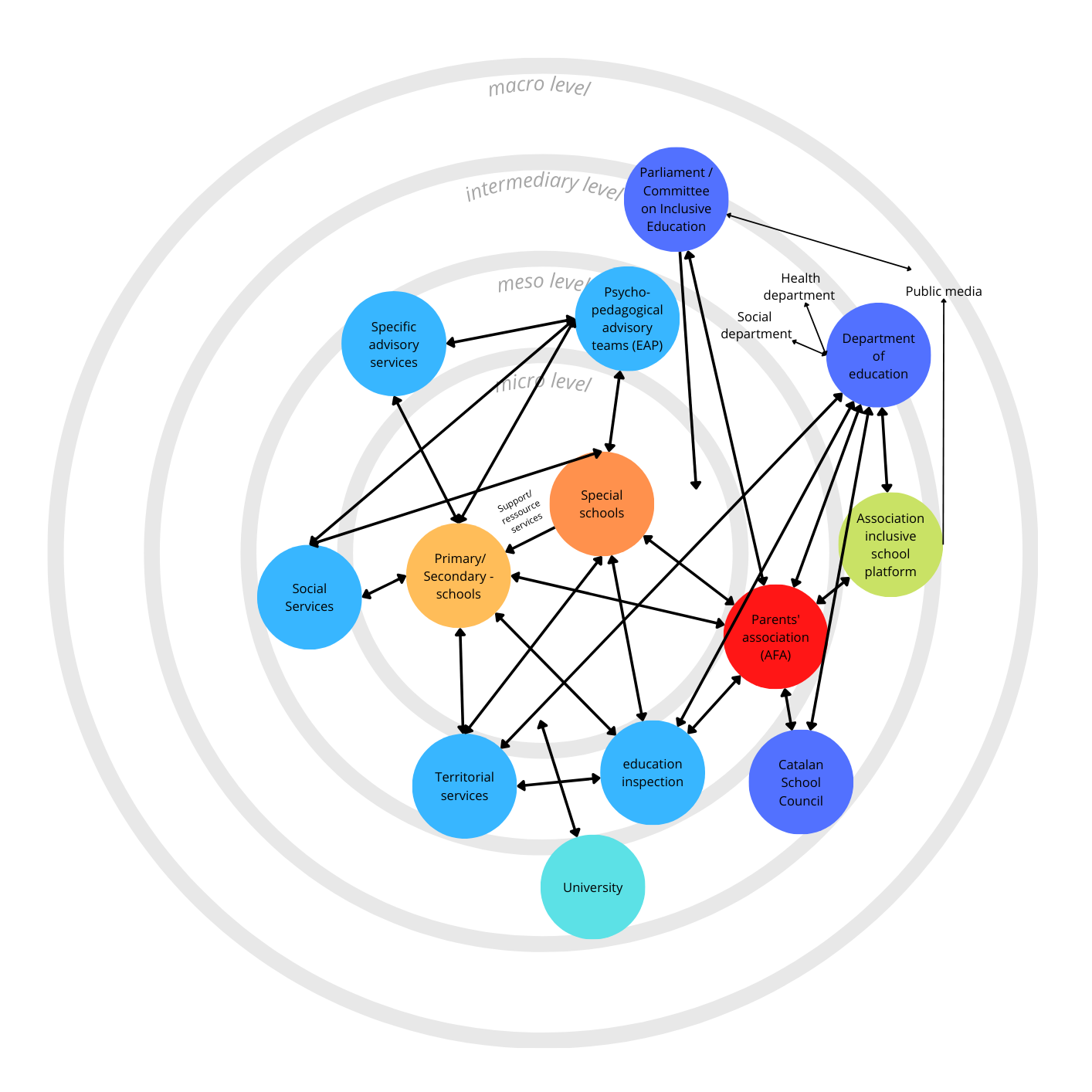Network analysis
Catalonia























Representation of the actors and agents involved in the Governance of Inclusive Education in the school system and participating in the Round-Table-Meetings in the school administration region Catalonia within the international project.
Text description of the network analysis
The image displays a diagram illustrating the different levels of an educational system and how various entities interact within it. It’s structured in concentric circles, indicating different levels of interaction from micro to macro.
At the micro level, there are two primary nodes: “General schools” and “Special schools,” each connected to “Territorial services.” The General schools are also connected to “Support services & resources” and the “Parents’ association (AMPA),” which is highlighted in red.
At the meso level, there are several nodes: “Psycho-pedagogical advisory teams (EAP),” “Central services – education inspection,” and the “University.” These are connected to both micro-level school types and each other.
At the intermediary level, we have “Parliament / Committee on Inclusive Education,” “Health department,” “Social department,” “Department of education,” “Association inclusive school platform,” and the “Catalan School Council.” These are connected to the entities at the meso level and to each other, forming a complex web of relationships.
At the macro level, “Public media” appears connected to the intermediary level’s Parliament / Committee and Department of education.
The lines between the nodes suggest communication or influence pathways, and the placement of entities within the circles implies their operational level within the educational ecosystem, from the individual schools at the micro-level to the larger societal institutions like media and parliament at the macro level.
Entity descriptions
University
Universities are the higher education institutions responsible for teacher education and training. Next to teaching, they carry out research and pursue the third mission.
Parliament/ Committee on Inclusive Education
Commission of the Parliament of Catalonia established in 2021 which aims to guarantee an inclusive education system from the zero to three-year educational stage up to the post-compulsory stage that reinforces the fairness of the system and improves attention to students with specific educational support needs and special educational needs, both during school and non-school hours (field trips and camps, lunch time, extracurricular activities, etc.), and at the same time support the pedagogical work of teachers, who have to face daily increasing complexity in classrooms.
Psychopedagogical Advisory Team (EAP)
Multidisciplinary teams that support teachers and educational centers in responding to the diversity of students and in relation to students with special educational needs, as well as their families.
Schools
Educational establishment in which early childhood education and basic education are taught.
Special schools
School attended by pupils with very severe and permanent disabilities up to the age of 21.
Parents' association (AFA)
Association formed by mothers, fathers and guardians or legal guardians of the students of a center whose purpose is to promote participation in the decision-making bodies of the center and organize activities that complement the educational project of the center, among other functions.
Association inclusive school platform
Platform that brings together various associations for the promotion of inclusive and quality education for all students, and especially for students with disabilities.
Department of education
The Department of Education in Catalonia is responsible for managing and developing the educational system in the region, overseeing policies, curriculum, and educational initiatives to enhance learning and support schools.
Territorial services
Territorial services refer to each of the delegations that the Department of Education has in the Catalan territory which is responsible for facilitating the implementation of policies and the management of resources at the local and educational center level. There are 11 territorial services and the Barcelona Education Consortium.
Central services - education inspection
It refers to the headquarters of the Department of Education, located in Barcelona, which is in charge of drawing up educational policies and managing the resources to carry them out.
Catalan School Council
Superior body for consultation and participation of the affected sectors in the general programming of non-university education of the Government of Catalonia.
This work is licensed under Attribution-NonCommercial-ShareAlike 4.0 International